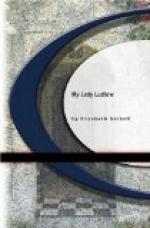“Indeed, my lady, I have long left off trying to conjecture what makes Jack fancy Gill, or Gill Jack. It’s best to sit down quiet under the belief that marriages are made for us, somewhere out of this world, and out of the range of this world’s reason and laws. I’m not so sure that I should settle it down that they were made in heaven; t’other place seems to me as likely a workshop; but at any rate, I’ve given up troubling my head as to why they take place. Captain James is a gentleman; I make no doubt of that ever since I saw him stop to pick up old Goody Blake (when she tumbled down on the slide last winter) and then swear at a little lad who was laughing at her, and cuff him till he tumbled down crying; but we must have bread somehow, and though I like it better baked at home in a good sweet brick oven, yet, as some folks never can get it to rise, I don’t see why a man may not be a baker. You see, my lady, I look upon baking as a simple trade, and as such lawful. There is no machine comes in to take away a man’s or woman’s power of earning their living, like the spinning-jenny (the old busybody that she is), to knock up all our good old women’s livelihood, and send them to their graves before their time. There’s an invention of the enemy, if you will!”
“That’s very true!” said my lady, shaking her head.
“But baking bread is wholesome, straight-forward elbow-work. They have not got to inventing any contrivance for that yet, thank Heaven! It does not seem to me natural, nor according to Scripture, that iron and steel (whose brows can’t sweat) should be made to do man’s work. And so I say, all those trades where iron and steel do the work ordained to man at the Fall, are unlawful, and I never stand up for them. But say this baker Brooke did knead his bread, and make it rise, and then that people, who had, perhaps, no good ovens, came to him, and bought his good light bread, and in this manner he turned an honest penny and got rich; why, all I say, my lady, is this,—I dare say he would have been born a Hanbury, or a lord if he could; and if he was not, it is no fault of his, that I can see, that he made good bread (being a baker by trade), and got money, and bought his land. It was his misfortune, not his fault, that he was not a person of quality by birth.”
“That’s very true,” said my lady, after a moment’s pause for consideration. “But, although he was a baker, he might have been a Churchman. Even your eloquence, Miss Galindo, shan’t convince me that that is not his own fault.”
“I don’t see even that, begging your pardon, my lady,” said Miss Galindo, emboldened by the first success of her eloquence. “When a Baptist is a baby, if I understand their creed aright, he is not baptized; and, consequently, he can have no godfathers and godmothers to do anything for him in his baptism; you agree to that, my lady?”
My lady would rather have known what her acquiescence would lead to, before acknowledging that she could not dissent from this first proposition; still she gave her tacit agreement by bowing her head.




